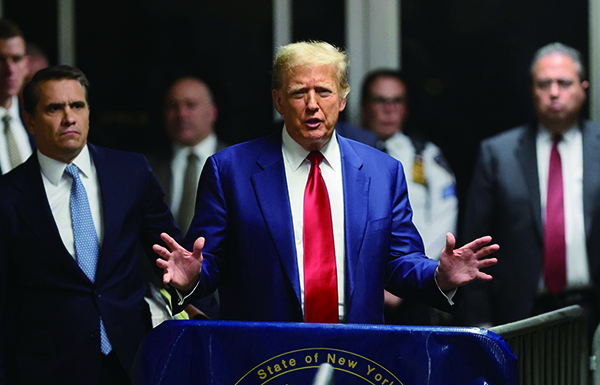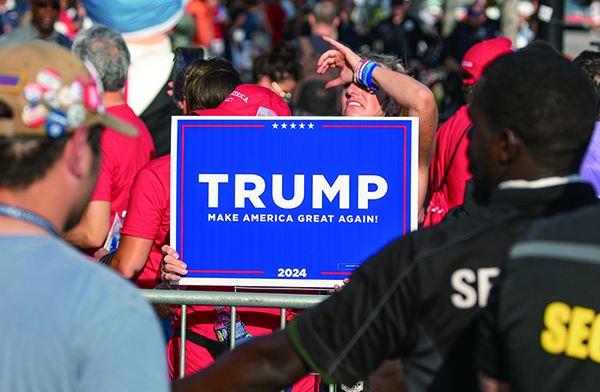 |
| Former US President Donald Trump. photo bloomberg |
“When the next government takes office, the ‘Second Trans-Pacific Partnership (TPP)’ committed by the Joe Biden administration will be abolished on the first day of its term. This is worse than the first one. “It’s another massive globalization monster designed to drive outsourcing to Asia, and it’s threatening to crush (our) farmers and manufacturers.”
Former U.S. President Donald Trump visited Iowa on November 18, 2023 (local time) and said this. The intention is to immediately abolish the Indo-Pacific Economic Framework (IPEF), which the Biden administration has painstakingly negotiated, by viewing it as another TPP.
IPEF is an economic consultative body in which 14 countries in the Indo-Pacific (Indo-Pacific) region, including Korea, have agreed on three of the four pillars - supply chain, clean economy, and fair economy. I was trying. There was a big stir among countries in the India-Thailand region. This is because the United States' withdrawal from IPEF will jeopardize institutional arrangements such as stable trade order and environmental cooperation in the India-Pacific region and increase uncertainty, jeopardizing the recovery of the region and the global economy. Now, as the possibility of Trump's re-election slowly rises to the surface, the world is busy assessing and preparing for its impact.
Trump's second term has repercussions for the global economy due to the return of the tariff war.
If Trump is re-elected, the impact is expected to bring significant changes to the global economic order. The World Trade Organization (WTO), which has regulated the multilateral trade order, will become even more powerless. Many of the agreements reached at the 13th WTO Trade Ministers' Meeting (MC 13) held at the end of February 2024 will be in vain. For example, an agreement to come up with a reform plan for the WTO dispute resolution process by the end of the year is also hopeless. Investment facilitation for development (IFD) is also likely to drift.
The steel and aluminum tariff war, which was an issue during Trump's first term, will also be repeated in a more evolved form. If the plan announced by Trump and his campaign members becomes reality, it would impose a 10% tariff on all U.S. imports in 2025, a 60% tariff on Chinese imports, and eliminate imports of essential goods from China within four years. It will be tried. If this happens, Americans will suffer from high inflation again and real income will decrease. It is clear that the world trade order will head toward catastrophe and become a bloody economic battlefield rife with retaliatory measures.
The German Economic Institute (GEI) estimated the impact if China retaliated with a 40% tariff on US imports in response to the high tariffs discussed earlier. According to the study, the United States is expected to lose up to $1 trillion (about 1,367 trillion won) in gross domestic product (GDP) over four years. This will be a huge blow to the global economy, which is heavily dependent on the U.S. economy. The level of global GDP will be lowered by 1 percentage point in 2028. In the case of Germany, which relies heavily on exports, it is estimated that GDP will decrease by 1.4 percentage points compared to the previous level. Our country is expected to suffer a similar blow.
More advanced protectionism measures also increase the burden on businesses.
Sanctions against some Chinese companies, including Huawei, during Trump's first term have been expanded to extensive export controls, import and investment regulations, and secondary boycotts under the Biden administration. Trump's second term is expected to continue this process while eliminating exceptions allowed by the Biden administration through negotiations with individual companies or countries. For example, this means that the toxic provisions contained in the Semiconductor Chip and Science Act or the Inflation Reduction Act (IRA) will be implemented as is without suspension or relaxation. If this happens, our country's semiconductor, electric vehicle and battery industries will be significantly affected. For example, the import of equipment from European companies into the semiconductor factories of large Korean companies invested in China could be greatly affected. Exports of electric vehicles to the United States may be restricted again.
Transatlantic relations between the United States and Europe are expected to deteriorate in particular, which will also have a negative impact on Pacific countries. Topics covered by the ongoing U.S.-EU Trade Technical Committee (TTC) include transatlantic technology standards, climate and clean technologies, supply chain security, digital security, data governance and technology platforms, export controls, and investment screening. It covers recent key international trade issues, such as digital utilization of small and medium-sized businesses. However, if agreement is delayed in this area, companies operating in the Indo-Pacific region will face a business environment with great uncertainty due to the lack of transparent and reasonable regulatory measures. In addition, areas that were already problematic during Trump's first term, such as steel and aluminum trade issues, North Atlantic Treaty Organization (NATO) defense cost sharing issues, and disintegrating environmental cooperation, will again turn into conflict.
 |
| photo shutterstock |
Korea’s response plan is
What should our response be? First, rather than wasting time trying to lower the possibility of Trump's re-election and making hopes, we should assume a case where Trump is re-elected, like in Europe, and quickly prepare measures for it. While the EU is working to build connections with Trump's associates, on the other hand, it is assessing the impact of Trump's administration and is reorganizing digital taxes that could hurt American digital companies. The Critical Minerals Agreement and the Global Agreement on Sustainable Steel and Aluminum are also underway.
Second, rather than unilaterally backing out of negotiations with the upcoming second Trump administration, we must do our best to calculate what we will give and what we will receive and make the most of it. If the imposition of a 10% tariff is realized, the issue must be actively raised because it is a measure that violates the Korea-U.S. Free Trade Agreement (FTA). Demands for sharing defense costs will intensify, and there is a need to keep pace with other countries, including Europe. At the same time, you have to buy time.
Third, cooperation should be strengthened with likeminded countries other than the United States, such as the EU, Japan, Australia, and Canada, in the areas of supply chain stability, green transition, mineral agreements, non-tariff barriers, and labor and environmental conditions. All available measures, including bilateral and small-scale cooperation, must be explored. There is a need to have prior discussions with these countries in preparation for Trump's election, or to actively participate in the various measures being planned or implemented.
Fourth, let’s use Trump’s re-election as a positive opportunity. Currently, the green transition is spreading into a trade dispute, putting significant pressure on Korean industries that are lagging behind the green transition. If America goes back to its fossil fuel base, we can buy ourselves a little more time for a green transition. We must use this as an opportunity to steadily advance our green transition, which lags far behind Europe, the United States, and China, and keep pace with other countries. This is especially urgent in the power sector.






